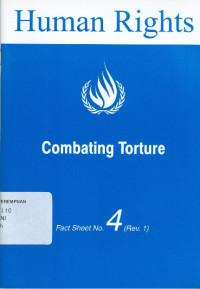
Text
Combating torture fact sheet no. 4 (rev. 1)
intended to assist an eve-wider audience in better understanding basic human rights, what the United Nations is doing to promote and protect them, and the international machinery availabe to help real. Torture seeks to annihilate the victim’s personality and denies the inherent dignity of the human being. The United Nations has condemned torture from the outset as one of the vilest acts perpetrated by human beings on their fellow creatures. Torture is a crime under international law. According to all relevant instruments, it is absolutely prohibited and cannot be justified under any circumstances. This prohibition forms part of customary international law, which means that it is binding on every member of the international community, regardless of whether a State has ratified international treaties in which torture is expressly prohibited. The systematic or widespread practice of torture constitutes a crime against humanity. In 1948, the international community condemned torture and other cruel, inhuman or degrading treatment in the Universal Declaration of Human Rights adopted by the United Nations General Assembly. In 1975, responding to vigorous activity by non-governmental organizations (NGOs), the General Assembly adopted the Declaration on the Protection of All Persons from Being Subjected to Torture and Other Cruel, Inhuman or Degrading Treatment or Punishment. During the 1980s and 1990s, progress was made both in the development of legal standards and instruments and in enforcement of the prohibition of torture. The United Nations Voluntary Fund for Victims of Torture was established by the General Assembly in 1981 to fund organizations providing assistance to victims of torture and their families. The Convention against Torture and Other Cruel, Inhuman, or Degrading Treatment or Punishment was adopted by the General Assembly in 1984 and came into force in 1987. Its implementation by States parties is monitored by a body of independent experts, the Committee against Torture. The first Special Rapporteur on torture, an independent expert mandated to report on the situation of torture in the world, was appointed by the Commission on Human Rights in 1985. During the same period, the General Assembly adopted resolutions in which it highlighted the role of health personnel in protecting prisoners and detainees against torture and established general principles for the treatment of detained persons. In December 1997, the General Assembly proclaimed 26 June United Nations International Day in Support of Victims of Torture.
Availability
| KP.1.000143 | KP.1 INT c | My Library | Available |
Detail Information
- Series Title
-
World Campaign for Human Rights
- Call Number
-
KP.1 INT c
- Publisher
- Jenewa : United Nations., 2006
- Collation
-
49p. ; 21cm.
- Language
-
English
- ISBN/ISSN
-
-
- Classification
-
KP.1
- Content Type
-
-
- Media Type
-
-
- Carrier Type
-
-
- Edition
-
-
- Subject(s)
- Specific Detail Info
-
-
- Statement of Responsibility
-
-
Other version/related
No other version available
File Attachment
Comments
You must be logged in to post a comment
 Computer Science, Information & General Works
Computer Science, Information & General Works  Philosophy & Psychology
Philosophy & Psychology  Religion
Religion  Social Sciences
Social Sciences  Language
Language  Pure Science
Pure Science  Applied Sciences
Applied Sciences  Art & Recreation
Art & Recreation  Literature
Literature  History & Geography
History & Geography